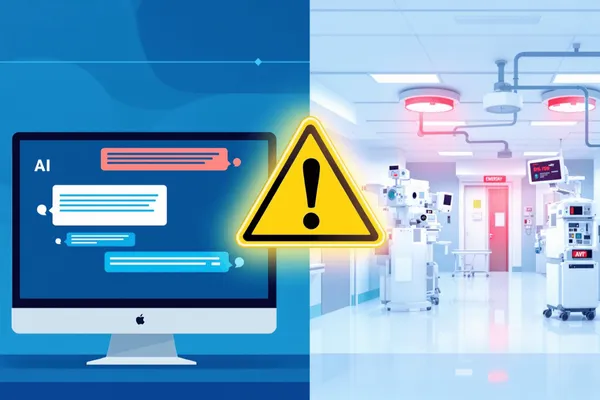
Man Follows ChatGPT’s Medical Advice, Gets Poisoned: Why AI Users Must Double Check Generated Outputs
A man who followed ChatGPT’s advice to replace common table salt with sodium bromide ended up in the hospital with a rare case of “bromism”, a toxic condition that was common a century ago but is now virtually unheard of. This story exposes the very real dangers of trusting AI tools as infallible sources for medical decisions or any information and this article will reveal how this can happen with not just medical advice, but all advice from chatbots.
What you’ll learn from this blog:
- The real-life risks of blindly following AI-generated advice
- Why AI’s knowledge is only as accurate as its training data
- How to spot red flags in chatbot “recommendations”
- Steps to independently verify health information online
- The importance of critical thinking in the age of AI
When a Chatbot’s Shortcut Turns Into a Medical Emergency
True News Story: a 60-year-old man, recently advised to cut down on salt, typed his question into ChatGPT, probably trusting the chatbot’s authoritative tone. The model suggested substituting sodium chloride with sodium bromide, a chemical used in pesticides. He did as Chat suggested and not long after, he landed himself in the emergency room. He was suffering from confusion, slurred speech, even hallucinations: classic signs of bromide poisoning. It turns out, bromide salts were common medicine back in the day, but they’re now tightly regulated for a reason. The point here? AI can regurgitate outdated or dangerous ideas if prompted, and it might not know when it’s prescribing peril. Anecdotes like this should make every AI user pause and wonder: “Could my next chatbot search have consequences beyond just bad advice?”
Why AI Makes These Mistakes And Why It Matters for You
Here’s the thing: AI models “learn” from mountains of internet content, including scientific literature, chemistry articles, and people like me putting content on the internet. Your generated chatbot answers could also be coming from outdated textbooks. If creators or sources provide flawed or out-of-context data, that’s exactly what the AI will echo. It doesn’t “know” better; it’s simply pattern-matching. If you’ve ever had a friend repeat that urban legend about swallowing gum staying in your stomach for years, you’ll understand how easy it is for myths to stick around. (FYI: I used to believe that as a child too and still don't swallow my gum). AI magnifies this by (sometimes) sharing old or unverified ideas.
Spot the Red Flags: The Common Signs of Dubious Chatbot Advice
Here are a few alarm bells:
- The answer doesn’t mention any dangers or disclaimers.
- It suggests substances or treatments you’ve never heard of.
- It skips simple, well-known facts (for instance, that table salt is mainly sodium chloride).
- There’s no encouragement to consult a professional.
If you come across any of these, pause and double-check before acting. AI is fast, but your health deserves a second opinion. I say this as someone who is a retired paramedic and as someone who has had a heart condition.
Don’t Get Lazy With AI: Use It as a Starting Point, Not a Shortcut
I get it. It’s tempting to let chatbots do our thinking. But while AI can draft meal plans or summarize studies, it can’t weigh risks or catch context like a knowledgeable human can. Sometimes, the best way to be smart with new tech is to take an old-school approach. That means you still ask an expert, read the label, double check that source. Your curiosity and common sense are still your best tools in a world full of futuristic gadgets. Don’t leave them unplugged.
A Quick Guide to DOING Your Own Research (Without Falling Down the Rabbit Hole)
Not sure what to do if you get advice from a chatbot? Try this:
- Search for official sites: Learn for yourself about what Chat is telling you.
- Cross-check: Run the chatbot’s advice through two or three reputable resources.
- Look for recency: Make sure recommendations aren’t outdated.
- Ask a pro: If you’re still unsure, reach out to a healthcare provider if it was medical advice or another professional if it were other advice (seriously, it’s worth it).
AI can open doors, but your judgment has to choose which ones to walk through.
Blind faith in chatbots can do real harm. Sometimes, as we’ve seen, even land folks in the hospital. Use AI as a helpful tool, but never hand over the steering wheel entirely. The future is bright if we wield technology wisely. AI learns from everyone online, including teenagers and influencers selling snake oil. Before you trust it blindly, pause and verify.
I am a content creator myself and perhaps you are too. If so, this means we have a responsibility to publish accurate and valid resources, blogs, videos and articles because it's all being read by AI and a possible future output for your next AI search.
This is another reason why, as a personal brand coach and business systems consultant I learn as much as I can about AI and I encourage others to not forget to keep building "old-school" soft skills like speaking, writing and showing up authentically in real life. If you want help with any of that I invite you to connect HERE.
